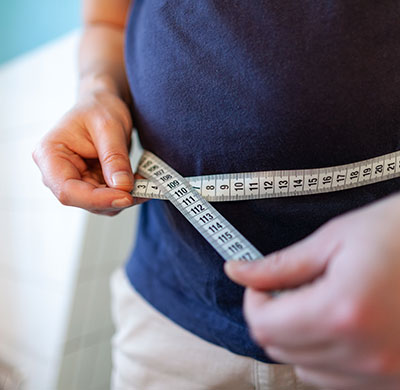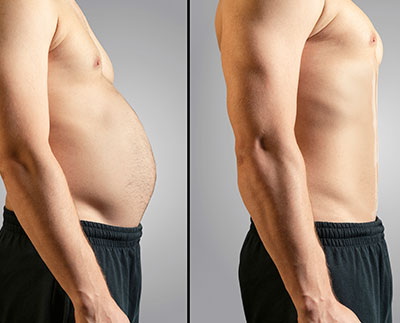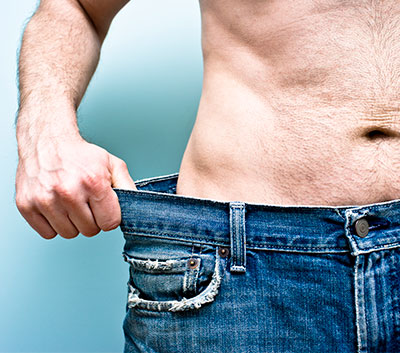What Is the Relationship Between Testosterone Body Fat and Weight Loss?
There is a definite and direct relationship between testosterone, your percentage of body fat, and your ability to lose weight.
Low testosterone and your percentage of body fat, particularly belly fat, are intimately linked. Men who are overweight are more likely to have low testosterone, and men with low testosterone are also more likely to become obese.
Men of all ages who are obese see a corresponding drop in testosterone. Even teens and men in their 20s who are overweight have low testosterone. This becomes even more of a problem as men grow older, their metabolism slows, and they tend to put on weight at the same time that they are experiencing the natural drop in testosterone that occurs as men age.
Medical researchers have found that obesity and low testosterone go hand-in-hand. One recent study concluded that obese men were almost 10x more likely to have low testosterone than men who are not overweight.
That study looked at the relationship between body mass index (BMI) and testosterone levels in men and the effects of weight loss on testosterone levels in a group of very obese men (with a BMI greater than 40) undergoing weight loss surgery; the link between obesity and testosterone levels in young men aged 14–20 years; and the relationship between health and lifestyle factors, including weight loss, and testosterone levels in men as they get older.
Among other conclusions, the study found:
- Obesity is a major cause of low testosterone levels.
- Hypogonadism is found in 75% of men considered very obese.
- The link between obesity and low testosterone levels is found in men of all ages, even in young men and teenagers.
What Is the Relationship Between Testosterone Body Fat and Weight Loss?
Obesity and low testosterone are tightly linked. In recent years, medical science has recognized the links between low testosterone and other medical conditions. Most notably, men with low testosterone tend to suffer from various "metabolic conditions," such as diabetes, high blood pressure, and heart disease. Men with low testosterone also tend to be overweight.
The link between being overweight and testosterone could not be any cleaner. Obese men are more likely to have low testosterone. Men with low testosterone are also more likely to become obese.
Your testosterone level and your percentage of body fat are intricately linked.
How Being Overweight Affects Your Testosterone Levels
Clearly, the link between testosterone and body fat exists. But just how does being overweight lower your testosterone level? Fat cells metabolize testosterone to estrogen, which lowers testosterone. Also, obesity reduces sex hormone-binding globulin (SHBG) levels, a protein that carries testosterone in the blood. Less SHBG means less free testosterone.
Research studies have shown many times that obesity lowers testosterone levels. For example, according to Harvard Health, a 2007 study of men aged 40 and above found that each one-point increase in body mass index (BMI) was associated with a 2% decrease in testosterone. Obesity is defined as BMI is 30 or higher.
That same Harvard Health report cited a 2008 study of men aged 30 and over found that waist circumference was an even stronger predictor of low testosterone levels than BMI. A four-inch increase in waist size increased a man’s odds of having a low testosterone level by 75%; for comparison, ten years of aging increased the odds by only 36%. All in all, waist circumference was the strongest single predictor of developing symptoms of testosterone deficiency.
In Australia, a study was conducted that found almost one in every seven obese men could benefit from testosterone replacement, a rate more than four times higher than in nonobese men.
A 2014 study published in the Asian Journal of Andrology found that even “moderate obesity” could lead to drops in testosterone, with the researchers concluding, “moderate obesity predominantly decreases total testosterone due to insulin resistance-associated reductions in SHBG.”
Does Excess Body Fat Impact Testosterone Levels?
It has long been suspected that there was a relationship between low testosterone levels and obesity. The studies presented here and many others confirm that link. These studies also have shown this link between low-T and increased body fat is also present in men under 40.
This is quite notable because doctors have always thought that the decrease in testosterone seen in older men was only due to age. These studies have shown that even in young men in their 30s and 40s that are extremely obese, that excessive body fat also leads to low testosterone. This indicates that a good part of the drop in testosterone typical of older men is actually due to the extra weight many men put on as they get older, and not merely because they are “growing old.”
This means that there is a good chance that testosterone levels can rebound – no matter your age — through weight loss!
Men with low testosterone tend to be obese. Men who are obese tend to have low testosterone.
Testosterone and Weight Loss
Weight loss, and in particular a reduction in belly fat, is a benefit experienced by almost all of our patients on testosterone replacement therapy.
Not only can boosting your testosterone through testosterone therapy help you lose weight, as you lose weight, you also further increase your testosterone levels!
Several research studies have found that losing weight through diet and exercise can increase testosterone levels. Specific exercises, such as strength training and weightlifting, have been proven to significantly raise testosterone levels.
A remarkably interesting study on the link between high body fat and testosterone found that morbidly obese men who have lost substantial weight thanks to bariatric surgery saw significant increases in testosterone levels after the procedure. The study found that low testosterone in obese males was rapidly reversed – in as little as 3 to 4 weeks – following bariatric surgery.
These and other studies, as well as our own anecdotal evidence with our testosterone patients, provide clear evidence that testosterone therapy is effective in helping people – and men in particular – lose weight.
The benefits of testosterone replacement for weight loss are not limited to a reduction of body fat. Among the other benefits of testosterone for weight loss, we find the following:
- Increased energy
- Improved mitochondrial function
- Better cardio-metabolic function
- Enhanced physical activity
- Increased motivation
- Lowered risk of cardiovascular disease
This all becomes a kind of positive feedback loop. When a person has more energy, he or she is more likely to exercise, eat well, and engage in social and physical activities, which, in turn, aid in weight loss and increased testosterone levels.
Low Testosterone and Weight Gain
Just as increasing your testosterone levels can add in weight loss, many studies have shown that low testosterone can lead to weight gain.
The relationship between low testosterone — a condition also known as "Low T" or andropause — and weight gain can become a vicious cycle. Low testosterone causes a lack of energy, slower metabolism, and insulin resistance, all of which lead to weight gain. Those extra pounds, in turn, further lower your testosterone. It becomes a negative feedback loop; the more weight you gain, the lower your testosterone levels drop.
You can break the cycle by exercising and making other lifestyle changes that are designed to lose weight. As you boost your testosterone level, you increase lean muscle. Increased lean muscle raises your metabolism and helps you to burn more fat. Burning more fat increases your energy, and now you can exercise more and even further increase your testosterone levels.
Men with low testosterone who are overweight and cannot raise their testosterone levels by lifestyle changes alone could be good candidates for testosterone replacement therapy.
Testosterone therapy has been proven to help men with low testosterone to gain muscle and lose weight, particularly belly fat. In addition to weight loss, some of the other benefits of testosterone replacement therapy for men over 40 include:
- Increased libido and improve sexual function
- Increase energy and stamina
- Improved memory and cognition
- Better sleep
- Better moods
Significant weight loss can be achieved with testosterone replacement therapy.
Now that you know a bit more about the links between testosterone, body fat, and obesity, why not contact us today, and find out more about the many life-changing benefits of testosterone replacement therapy.





